
Your Muir torre syndrome dermnet images are available. Muir torre syndrome dermnet are a topic that is being searched for and liked by netizens today. You can Download the Muir torre syndrome dermnet files here. Download all royalty-free vectors.
If you’re searching for muir torre syndrome dermnet pictures information connected with to the muir torre syndrome dermnet keyword, you have visit the ideal blog. Our site always provides you with suggestions for refferencing the maximum quality video and picture content, please kindly search and locate more enlightening video articles and graphics that match your interests.
Muir Torre Syndrome Dermnet. MuirTorre syndrome is a rare hereditary autosomal dominant cancer syndrome that is thought to be a subtype of HNPCC. Sebaceous hyperplasia codes and conceptsopen. Muir-Torre syndrome MTS is considered a phenotypic variant of hereditary nonpolyposis colorectal carcinoma syndrome HNPCC Lynch syndrome and is caused by germline mutations in one allele of the DNA mismatch repair MMR genes most commonly MLH1 MSH2 MSH6 and PMS2. Sweets syndrome is a neutrophilic dermatosis characterised by fever peripheral neutrophil leucocytosis and the acute onset of painful erythematous papules nodules or plaques 25 of cases are associated with malignancy which is more likely if the rash affects the face.
 Muir Torre Syndrome Photo Skin Disease Pictures From dermnet.com
Muir Torre Syndrome Photo Skin Disease Pictures From dermnet.com
Patients with Muir-Torre syndrome develop sebaceous adenomas. The proteins help fix mistakes that are made when DNA is copied before cells divide. Some patients with this syndrome also develop keratoacanthoma. MuirTorre Syndrome MTS is a rare hereditary autosomal dominant cancer syndrome that is thought to be a subtype of HNPCC or Lynch Syndrome. It is not the same as adenoma sebaceum by F. Sebaceous adenomas in isolation are not significant.
The genes affected are MLH1 MSH2 and more recently MSH6 and are involved in DNA mismatch repair.
Although a wide range of internal malignancies have been reported the most frequently observed internal neoplasm is colorectal carcinoma. Muir-Torre Syndrome is a genetic predisposition to sebaceous adenoma and some cancers. Individuals are prone to develop cancers of the colon genitourinary tract and skin lesions such as keratoacanthomas and sebaceous tumors. Benign seborrhoeic hyperplasia Benign seborrheic hyperplasia Sebaceous gland hyperplasia. Muir-Torre syndrome MTS is a form of Lynch syndrome and is characterized by sebaceous oil gland skin tumors in association with internal cancers. MTS is associated with sebaceous neoplasia most commonly sebaceous adenoma.
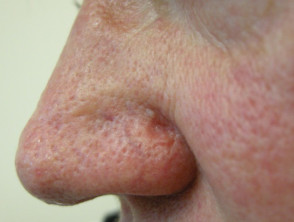 Source: dermnetnz.org
Source: dermnetnz.org
Because these rare skin lesions are seen more commonly in people with Lynch syndrome it is recommended that a person diagnosed with these lesions receive a genetic. Benign hair follicle tumour Dermatoscopy of sebaceous hyperplasia Treatment of sebaceous hyperplasia Muir-Torre syndrome Immunosuppression. Muir-Torre syndrome MTS is characterized by the presence of at least one sebaceous tumor and at least one visceral malignancy. It is also linked to hereditary nonpolyposis colorectal cancer Lynch syndrome. Such patients should be evaluated for occult gastrointestinal malignancy.
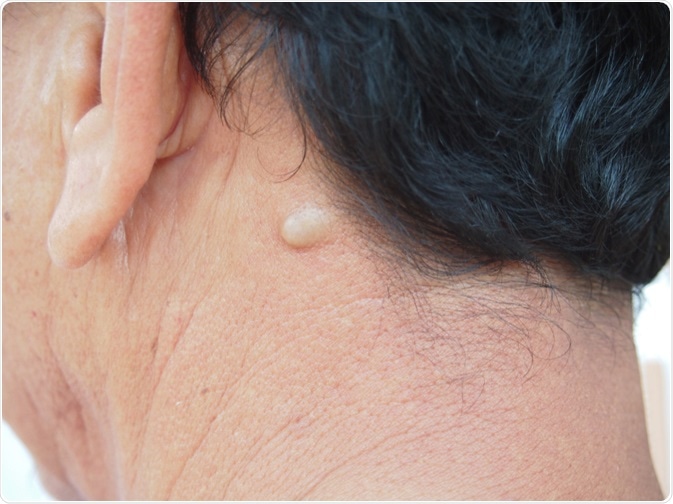 Source: theofy.world
Source: theofy.world
Patients on immunosuppressive therapy after organ transplant are at increased risk of developing keratoacanthomas and invasive squamous cell carcinoma. Such patients should be evaluated for occult gastrointestinal malignancy. MuirTorre syndrome is a rare hereditary autosomal dominant cancer syndrome that is thought to be a subtype of HNPCC. The Muir-Torre syndrome MTS is a cancer-associated genodermatosis characterized by multiple cutaneous lesions comprised of solitary or multiple sebaceous proliferations benign and malignant and keratoacanthomas in association with variable systemic cancers that are integral to Lynch syndrome LS or hereditary nonpolyposis colorectal cancer HNPCC phenotype. Muir-Torre syndrome is a subtype of Lynch syndrome and may be caused by changes mutations in either the MLH1 MSH2 or MSH6 gene.
 Source: dermnet.com
Source: dermnet.com
MuirTorre syndrome is a rare hereditary autosomal dominant cancer syndrome that is thought to be a subtype of HNPCC. Muir-Torre is another name for Lynch syndrome in which people develop uncommon skin lesions or tumors including sebaceous adenomas sebaceous epitheliomas sebaceous carcinomas and keratocanthomas. MuirTorre syndrome is a rare hereditary autosomal dominant cancer syndrome that is thought to be a subtype of HNPCC. The Muir-Torre syndrome. Muir-Torre syndrome MTS is considered a phenotypic variant of hereditary nonpolyposis colorectal carcinoma syndrome HNPCC Lynch syndrome and is caused by germline mutations in one allele of the DNA mismatch repair MMR genes most commonly MLH1 MSH2 MSH6 and PMS2.
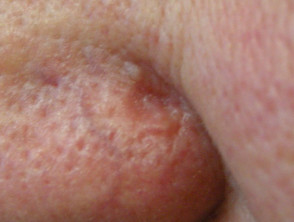 Source: dermnetnz.org
Source: dermnetnz.org
These tumors are believed incapable of spreading or growing fast enough to cause harm to physical structures. The Muir-Torre syndrome MTS is a cancer-associated genodermatosis characterized by multiple cutaneous lesions comprised of solitary or multiple sebaceous proliferations benign and malignant and keratoacanthomas in association with variable systemic cancers that are integral to Lynch syndrome LS or hereditary nonpolyposis colorectal cancer HNPCC phenotype. Benign seborrhoeic hyperplasia Benign seborrheic hyperplasia Sebaceous gland hyperplasia. Muir-Torre syndrome MTS is a rare autosomal dominant genetic disease characterized by tumors of the sebaceous oil glands of the skin such as sebaceous adenoma as well as malignancies of. Muir-Torre syndrome MTS is considered a phenotypic variant of hereditary nonpolyposis colorectal carcinoma syndrome HNPCC Lynch syndrome and is caused by germline mutations in one allele of the DNA mismatch repair MMR genes most commonly MLH1 MSH2 MSH6 and PMS2.
 Source: medindia.net
Source: medindia.net
Muir-Torre syndrome MTS is a rare autosomal dominant genetic disease characterized by tumors of the sebaceous oil glands of the skin such as sebaceous adenoma as well as malignancies of. A rare variant of hereditary nonpolyposis colorectal cancer associated with hMSH2 mutation. Muir-Torre syndrome MTS is considered a phenotypic variant of hereditary nonpolyposis colorectal carcinoma syndrome HNPCC Lynch syndrome and is caused by germline mutations in one allele of the DNA mismatch repair MMR genes most commonly MLH1 MSH2 MSH6 and PMS2. Dermnet does not provide medical advice diagnosis or treatment. 1 2 3 The most common internal site involved is the gastrointestinal tract with almost half of affected people having colorectal cancer followed by the genitourinary tract.
 Source: dermnet.com
Source: dermnet.com
Individuals are prone to develop cancers of the colon breast and genitourinary tract and skin lesions such as keratoacanthomas and sebaceous tumours. Muir-Torre is another name for Lynch syndrome in which people develop uncommon skin lesions or tumors including sebaceous adenomas sebaceous epitheliomas sebaceous carcinomas and keratocanthomas. 2 5 These genes give the body instructions to make proteins needed for repairing DNA. It is not the same as adenoma sebaceum by F. Muir-Torre syndrome is a subtype of Lynch syndrome and may be caused by changes mutations in either the MLH1 MSH2 or MSH6 gene.
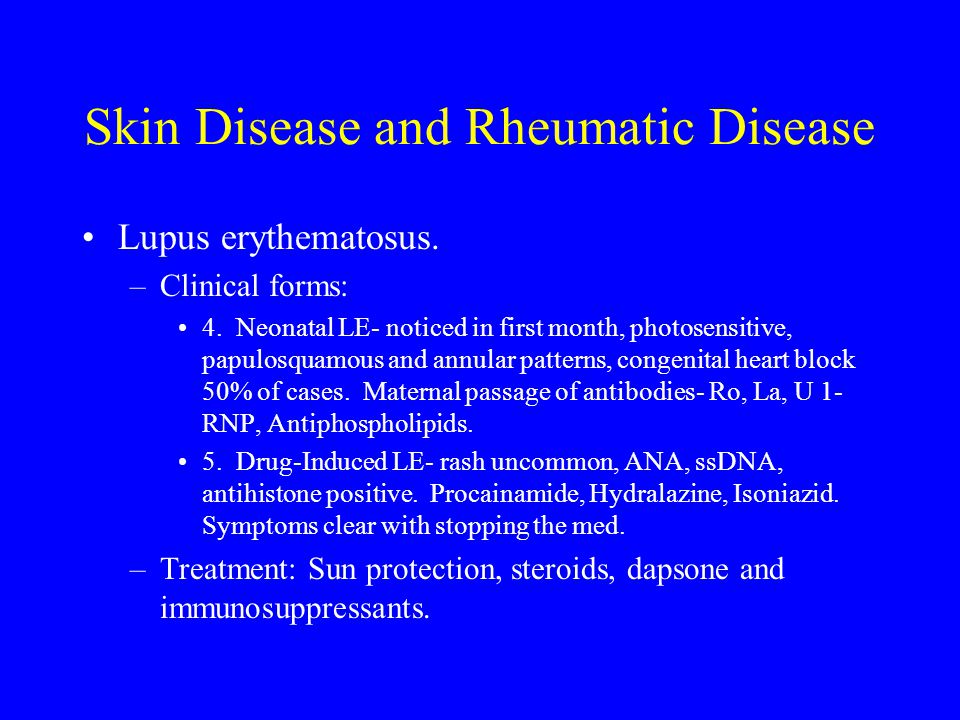 Source: slideplayer.com
Source: slideplayer.com
Sweets syndrome is a neutrophilic dermatosis characterised by fever peripheral neutrophil leucocytosis and the acute onset of painful erythematous papules nodules or plaques 25 of cases are associated with malignancy which is more likely if the rash affects the face. These tumors are believed incapable of spreading or growing fast enough to cause harm to physical structures. The Muir-Torre syndrome MTS is a cancer-associated genodermatosis characterized by multiple cutaneous lesions comprised of solitary or multiple sebaceous proliferations benign and malignant and keratoacanthomas in association with variable systemic cancers that are integral to Lynch syndrome LS or hereditary nonpolyposis colorectal cancer HNPCC phenotype. Some patients with this syndrome also develop keratoacanthoma. It is not the same as adenoma sebaceum by F.

Such patients should be evaluated for occult gastrointestinal malignancy. Sweets syndrome is a neutrophilic dermatosis characterised by fever peripheral neutrophil leucocytosis and the acute onset of painful erythematous papules nodules or plaques 25 of cases are associated with malignancy which is more likely if the rash affects the face. The genes affected are MLH1 MSH2 and more recently MSH6 and are involved in DNA mismatch repair. Benign seborrhoeic hyperplasia Benign seborrheic hyperplasia Sebaceous gland hyperplasia. A rare variant of hereditary nonpolyposis colorectal cancer associated with hMSH2 mutation.
 Source: vedit.co.id
Source: vedit.co.id
Dermnet does not provide medical advice diagnosis or treatment. Such patients should be evaluated for occult gastrointestinal malignancy. Use of images for any purpose including but not limited to research commercial personal or non-commercial use is prohibited without prior written. The Muir-Torre syndrome MTS is a cancer-associated genodermatosis characterized by multiple cutaneous lesions comprised of solitary or multiple sebaceous proliferations benign and malignant and keratoacanthomas in association with variable systemic cancers that are integral to Lynch syndrome LS or hereditary nonpolyposis colorectal cancer HNPCC phenotype. Muir-Torre Syndrome is a genetic predisposition to sebaceous adenoma and some cancers.
 Source: dermnet.com
Source: dermnet.com
Muir-Torre syndrome MTS is a form of Lynch syndrome and is characterized by sebaceous oil gland skin tumors in association with internal cancers. Am J Gastroenterol. Although a wide range of internal malignancies have been reported the most frequently observed internal neoplasm is colorectal carcinoma. MTS is associated with sebaceous neoplasia most commonly sebaceous adenoma. The Muir-Torre syndrome.
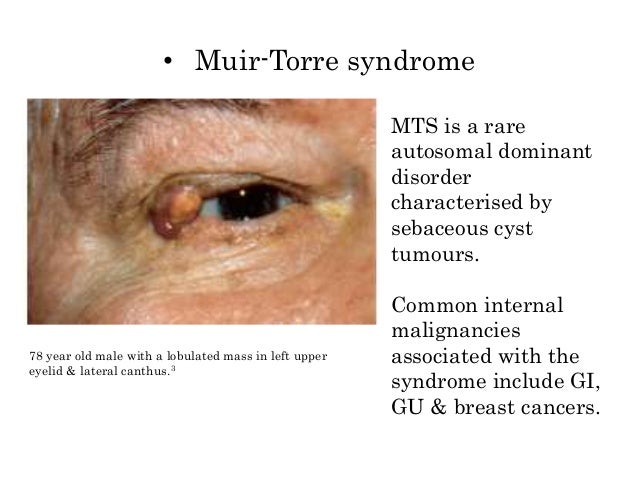 Source: slideshare.net
Source: slideshare.net
Muir-Torre syndrome MTS is a rare autosomal dominant genetic disease characterized by tumors of the sebaceous oil glands of the skin such as sebaceous adenoma as well as malignancies of. Use of images for any purpose including but not limited to research commercial personal or non-commercial use is prohibited without prior written. Muir-Torre syndrome MTS is considered a phenotypic variant of hereditary nonpolyposis colorectal carcinoma syndrome HNPCC Lynch syndrome and is caused by germline mutations in one allele of the DNA mismatch repair MMR genes most commonly MLH1 MSH2 MSH6 and PMS2. 2 5 These genes give the body instructions to make proteins needed for repairing DNA. Such patients should be evaluated for occult gastrointestinal malignancy.
 Source: medindia.net
Source: medindia.net
Sebaceous adenomas in isolation are not significant. It is also linked to hereditary nonpolyposis colorectal cancer Lynch syndrome. 1 2 3 The most common internal site involved is the gastrointestinal tract with almost half of affected people having colorectal cancer followed by the genitourinary tract. Benign hair follicle tumour Dermatoscopy of sebaceous hyperplasia Treatment of sebaceous hyperplasia Muir-Torre syndrome Immunosuppression. However they may be associated with Muir-Torre syndrome a genetic condition that predisposes individuals to cancer.
 Source: dermnet.com
Source: dermnet.com
Individuals are prone to develop cancers of the colon breast and genitourinary tract and skin lesions such as keratoacanthomas and sebaceous tumours. It is also linked to hereditary nonpolyposis colorectal cancer Lynch syndrome. For patients who do not have Muir-Torre syndrome there may be little need to surgically remove the sebaceous adenoma. The proteins help fix mistakes that are made when DNA is copied before cells divide. The Muir-Torre syndrome.
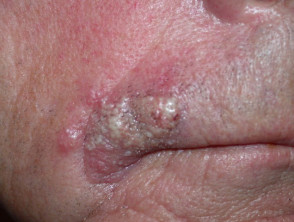 Source: dermnetnz.org
Source: dermnetnz.org
A rare variant of hereditary nonpolyposis colorectal cancer associated with hMSH2 mutation. The proteins help fix mistakes that are made when DNA is copied before cells divide. Muir-Torre syndrome MTS is a rare autosomal dominant genetic disease characterized by tumors of the sebaceous oil glands of the skin such as sebaceous adenoma as well as malignancies of. MuirTorre syndrome is a rare hereditary autosomal dominant cancer syndrome that is thought to be a subtype of HNPCC. 2 5 These genes give the body instructions to make proteins needed for repairing DNA.
 Source: dermnet.com
Source: dermnet.com
Because these rare skin lesions are seen more commonly in people with Lynch syndrome it is recommended that a person diagnosed with these lesions receive a genetic. Muir-Torre syndrome MTS is characterized by the presence of at least one sebaceous tumor and at least one visceral malignancy. Patients with Muir-Torre syndrome develop sebaceous adenomas. However they may be associated with Muir-Torre syndrome a genetic condition that predisposes individuals to cancer. 1 2 3 The most common internal site involved is the gastrointestinal tract with almost half of affected people having colorectal cancer followed by the genitourinary tract.
 Source: medindia.net
Source: medindia.net
Muir-Torre syndrome MTS is characterized by the presence of at least one sebaceous tumor and at least one visceral malignancy. These tumors are believed incapable of spreading or growing fast enough to cause harm to physical structures. Am J Gastroenterol. Sebaceous hyperplasia codes and conceptsopen. Muir-Torre syndrome MTS is a form of Lynch syndrome and is characterized by sebaceous oil gland skin tumors in association with internal cancers.
 Source: medindia.net
Source: medindia.net
It is not the same as adenoma sebaceum by F. Sebaceous adenomas in isolation are not significant. 1 2 3 The most common internal site involved is the gastrointestinal tract with almost half of affected people having colorectal cancer followed by the genitourinary tract. The Muir-Torre syndrome. Dermnet does not provide medical advice diagnosis or treatment.
 Source: vedit.co.id
Source: vedit.co.id
1 2 3 The most common internal site involved is the gastrointestinal tract with almost half of affected people having colorectal cancer followed by the genitourinary tract. Sebaceous adenomas in isolation are not significant. Muir-Torre syndrome MTS is considered a phenotypic variant of hereditary nonpolyposis colorectal carcinoma syndrome HNPCC Lynch syndrome and is caused by germline mutations in one allele of the DNA mismatch repair MMR genes most commonly MLH1 MSH2 MSH6 and PMS2. Benign hair follicle tumour Dermatoscopy of sebaceous hyperplasia Treatment of sebaceous hyperplasia Muir-Torre syndrome Immunosuppression. A rare variant of hereditary nonpolyposis colorectal cancer associated with hMSH2 mutation.
This site is an open community for users to do submittion their favorite wallpapers on the internet, all images or pictures in this website are for personal wallpaper use only, it is stricly prohibited to use this wallpaper for commercial purposes, if you are the author and find this image is shared without your permission, please kindly raise a DMCA report to Us.
If you find this site beneficial, please support us by sharing this posts to your favorite social media accounts like Facebook, Instagram and so on or you can also save this blog page with the title muir torre syndrome dermnet by using Ctrl + D for devices a laptop with a Windows operating system or Command + D for laptops with an Apple operating system. If you use a smartphone, you can also use the drawer menu of the browser you are using. Whether it’s a Windows, Mac, iOS or Android operating system, you will still be able to bookmark this website.







